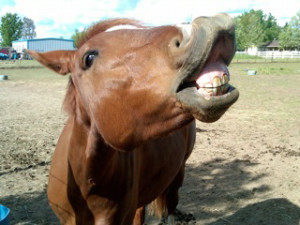
Routine and scheduled dental care for our equine partners is a very important aspect of horse care. Not just for the health of their mouth but for their ability to completely chew and process food sufficiently for digestion, which relates to how they process nutrition and how that translates to body weight; correctly carry and respond to a bit in their mouth; but also, and rarely considered, to help insure suppleness of the muscles of poll, neck, and back. Consider the following.
The design of the horse’s mouth requires floating teeth on a routine basis because the teeth in the upper jaw are set wider than the lower jaw. The result of eating and chewing sharpens the outside of the upper teeth and the inside of the lower teeth. Without floating (filing and evening the sharp edges) the mouth becomes sore from ulcers, teeth don’t meet and chew properly and stress accumulates from the teeth being clenched to avoid pain. Also, if the jaws don’t align correctly front to back, hooks will develop that further restrict normal jaw movement. Again, creating stress.
Here are the events to consider. Sharp edges of the teeth or hooks from normal chewing and feeding causes pain … the jaw clamps and is held rigid to avoid pain … resulting in the lower jaw not moving during the flexing of the poll … the tongue becomes lodged at the back of throat or is pushed forward out of mouth … muscles of the poll become tight and stressed … stress in the poll causes the neck to stiffen … a tight neck and poll cause the head to elevate when contact is taken and the muscles of the back hollow and become tight and sore.
Every event in this chain may not occur all the time but you can see how routine dental care affects more than just teeth.
“For want of a Nail the Shoe was lost; for want of a Shoe the Horse was lost; and for want of a Horse the Rider was lost; being overtaken and slain by the Enemy, all for want of Care about a Horse-shoe Nail.” ~ Benjamin Franklin, Poor Richard’s Almanack, June 1758
Equine Massage and Bodywork is not intended to replace veterinary care.
